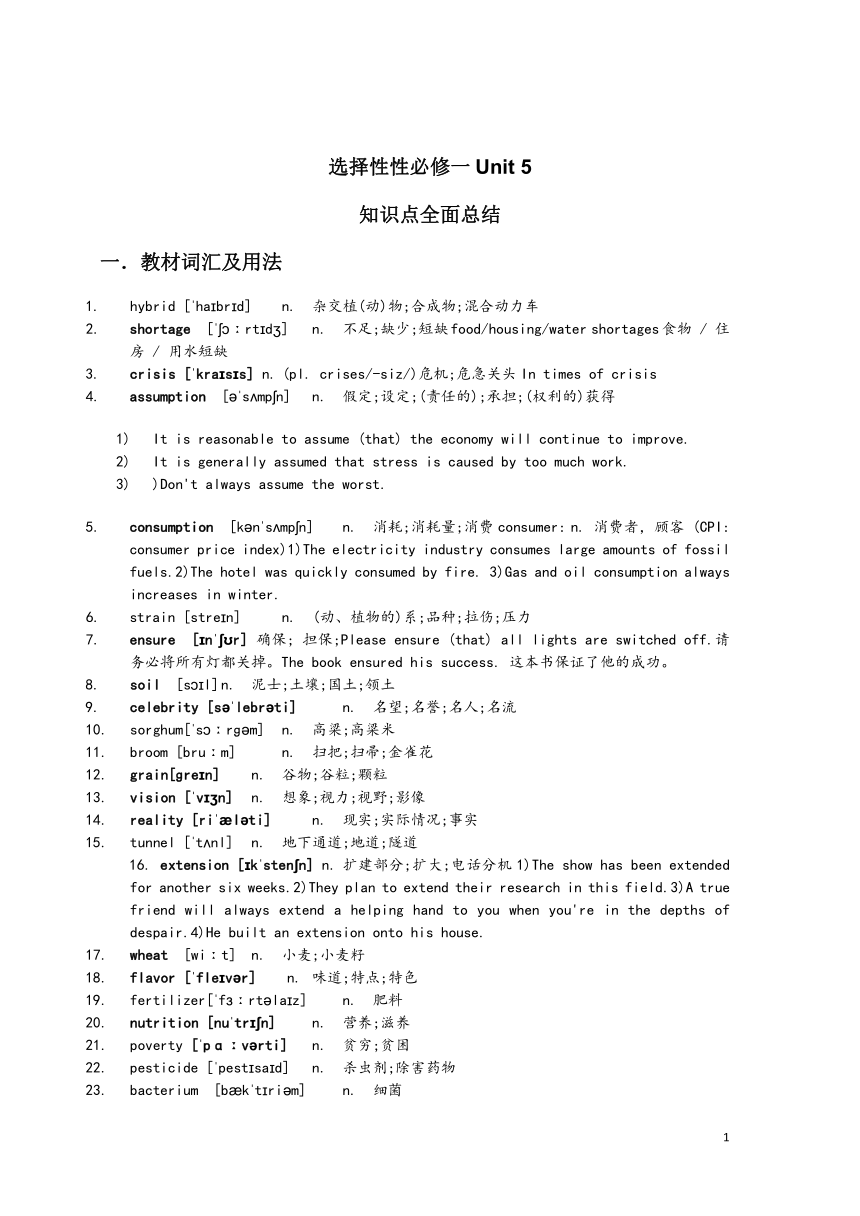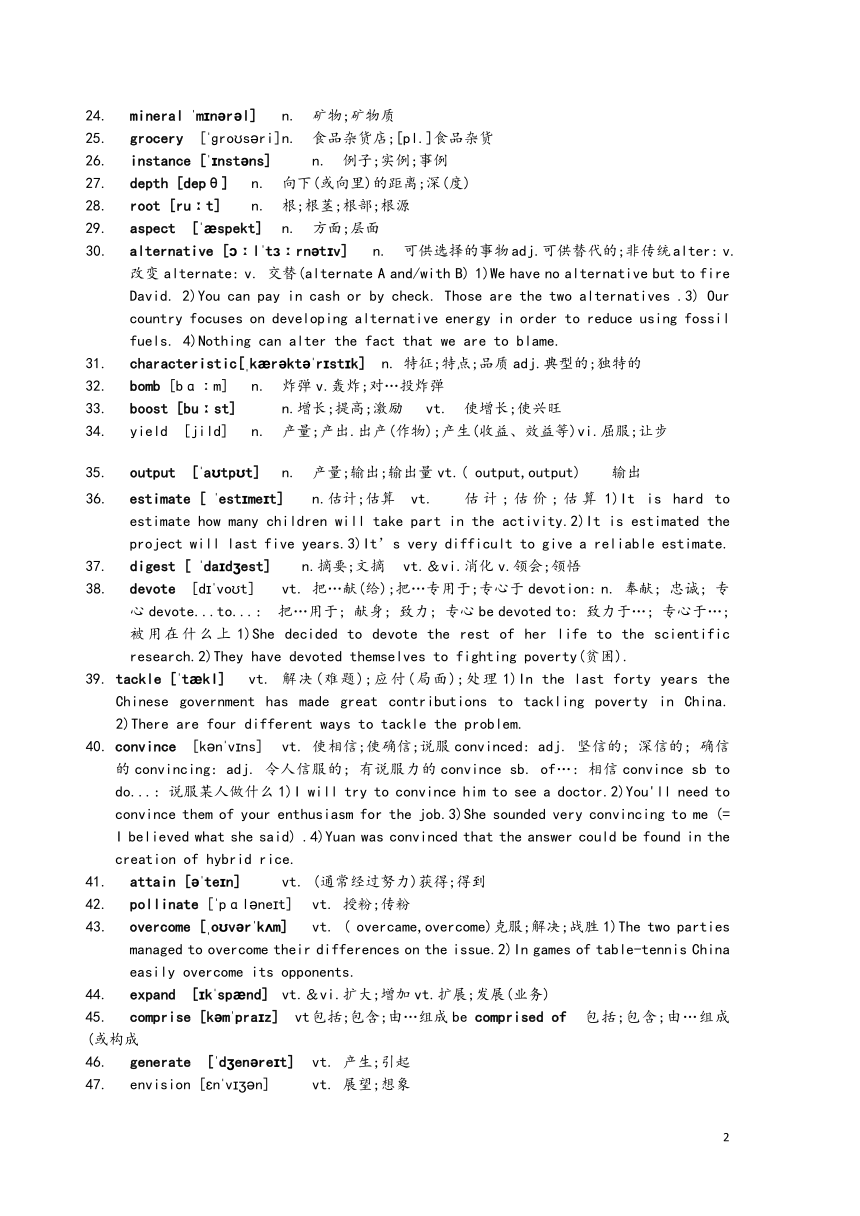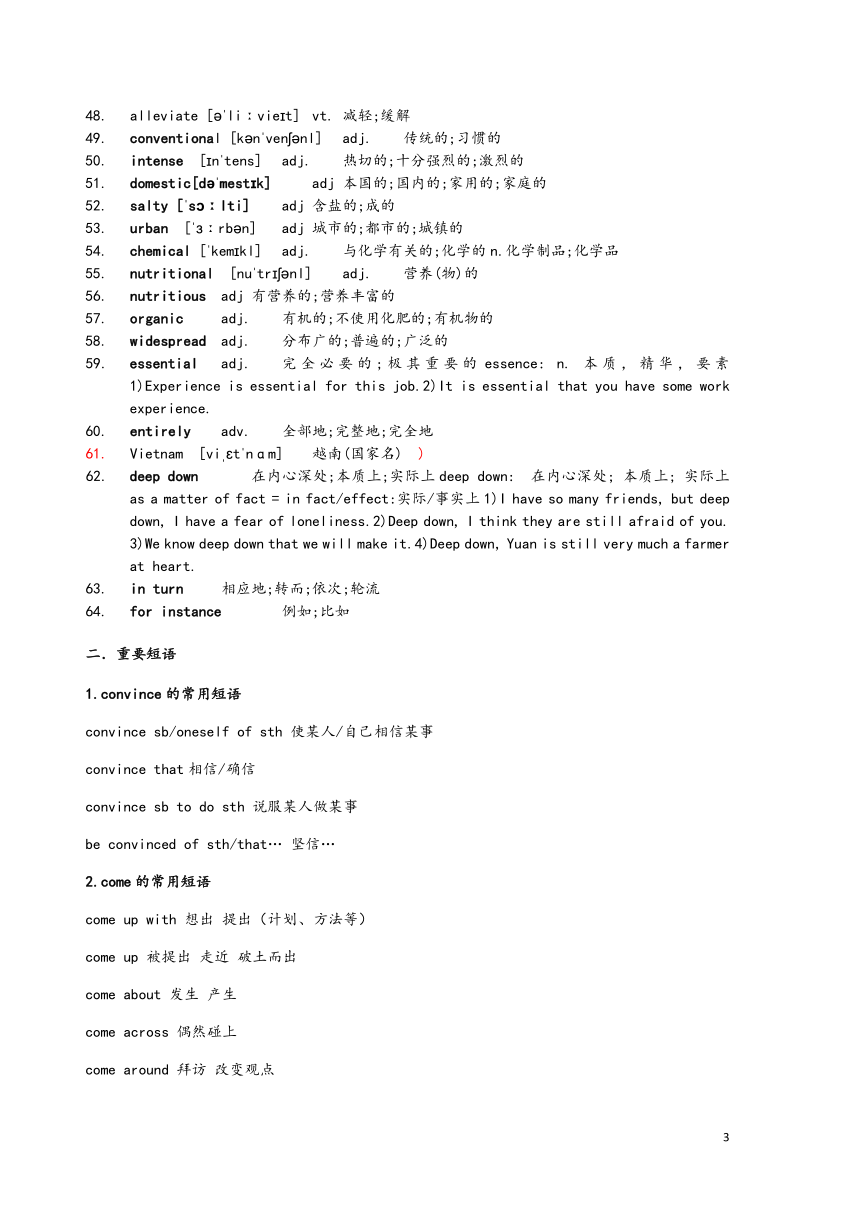2021-2022学年高中英语人教版2019选择性必修第一册Unit 5 Working the Land知识点总结讲义
文档属性
| 名称 | 2021-2022学年高中英语人教版2019选择性必修第一册Unit 5 Working the Land知识点总结讲义 |

|
|
| 格式 | zip | ||
| 文件大小 | 48.9KB | ||
| 资源类型 | 教案 | ||
| 版本资源 | 人教版(2019) | ||
| 科目 | 英语 | ||
| 更新时间 | 2021-11-22 00:00:00 | ||
图片预览




文档简介
选择性性必修一Unit 5
知识点全面总结
一.教材词汇及用法
hybrid [ ha br d] n. 杂交植(动)物;合成物;混合动力车
shortage [ rt d ] n. 不足;缺少;短缺food/housing/water shortages食物 / 住 房 / 用水短缺
crisis [ kra s s] n. (pl. crises/-siz/)危机;危急关头In times of crisis
assumption [ s mp n] n. 假定;设定;(责任的);承担;(权利的)获得
It is reasonable to assume (that) the economy will continue to improve.
It is generally assumed that stress is caused by too much work.
)Don't always assume the worst.
consumption [k n s mp n] n. 消耗;消耗量;消费consumer: n. 消费者,顾客 (CPI: consumer price index)1)The electricity industry consumes large amounts of fossil fuels.2)The hotel was quickly consumed by fire. 3)Gas and oil consumption always increases in winter.
strain [stre n] n. (动、植物的)系;品种;拉伤;压力
ensure [ n r] 确保; 担保;Please ensure (that) all lights are switched off.请务必将所有灯都关掉。The book ensured his success. 这本书保证了他的成功。
soil [s l] n. 泥士;土壤;国土;领土
celebrity [s lebr ti] n. 名望;名誉;名人;名流
sorghum[ s rɡ m] n. 高梁;高梁米
broom [bru m] n. 扫把;扫帚;金雀花
grain[ɡre n] n. 谷物;谷粒;颗粒
vision [ v n] n. 想象;视力;视野;影像
reality [ri l ti] n. 现实;实际情况;事实
tunnel [ t nl] n. 地下通道;地道;隧道
extension [ k sten n] n. 扩建部分;扩大;电话分机1)The show has been extended for another six weeks.2)They plan to extend their research in this field.3)A true friend will always extend a helping hand to you when you're in the depths of despair.4)He built an extension onto his house.
wheat [wi t] n. 小麦;小麦籽
flavor [ fle v r] n. 味道;特点;特色
fertilizer[ f rt la z] n. 肥料
nutrition [nu tr n] n. 营养;滋养
poverty [ pɑ v rti] n. 贫穷;贫困
pesticide [ pest sa d] n. 杀虫剂;除害药物
bacterium [b k t ri m] n. 细菌
mineral m n r l] n. 矿物;矿物质
grocery [ ɡro s ri] n. 食品杂货店;[pl.]食品杂货
instance [ nst ns] n. 例子;实例;事例
depth [depθ] n. 向下(或向里)的距离;深(度)
root [ru t] n. 根;根茎;根部;根源
aspect [ spekt] n. 方面;层面
alternative [ l t rn t v] n. 可供选择的事物adj.可供替代的;非传统alter: v. 改变alternate: v. 交替(alternate A and/with B) 1)We have no alternative but to fire David. 2)You can pay in cash or by check. Those are the two alternatives .3) Our country focuses on developing alternative energy in order to reduce using fossil fuels. 4)Nothing can alter the fact that we are to blame.
characteristic[ k r kt r st k] n. 特征;特点;品质adj.典型的;独特的
bomb [bɑ m] n. 炸弹v.轰炸;对…投炸弹
boost [bu st] n.增长;提高;激励 vt. 使增长;使兴旺
yield [jild] n. 产量;产出.出产(作物);产生(收益、效益等)vi.屈服;让步
output [ a tp t] n. 产量;输出;输出量vt.( output,output)输出
estimate [ est me t] n.估计;估算 vt. 估计;估价;估算1)It is hard to estimate how many children will take part in the activity.2)It is estimated the project will last five years.3)It’s very difficult to give a reliable estimate.
digest [ da d est] n.摘要;文摘 vt.&vi.消化v.领会;领悟
devote [d vo t] vt. 把…献(给);把…专用于;专心于devotion: n. 奉献; 忠诚; 专心devote...to...: 把…用于; 献身; 致力; 专心be devoted to: 致力于…; 专心于…; 被用在什么上1)She decided to devote the rest of her life to the scientific research.2)They have devoted themselves to fighting poverty(贫困).
tackle [ t kl] vt. 解决(难题);应付(局面);处理1)In the last forty years the Chinese government has made great contributions to tackling poverty in China. 2)There are four different ways to tackle the problem.
convince [k n v ns] vt. 使相信;使确信;说服convinced: adj. 坚信的; 深信的; 确信的convincing: adj. 令人信服的; 有说服力的convince sb. of…: 相信convince sb to do...: 说服某人做什么1)I will try to convince him to see a doctor.2)You'll need to convince them of your enthusiasm for the job.3)She sounded very convincing to me (= I believed what she said) .4)Yuan was convinced that the answer could be found in the creation of hybrid rice.
attain [ te n] vt. (通常经过努力)获得;得到
pollinate [ pɑl ne t] vt. 授粉;传粉
overcome [ o v r k m] vt. ( overcame,overcome)克服;解决;战胜1)The two parties managed to overcome their differences on the issue.2)In games of table-tennis China easily overcome its opponents.
expand [ k sp nd] vt.&vi.扩大;增加vt.扩展;发展(业务)
comprise [k m pra z] vt 包括;包含;由…组成be comprised of 包括;包含;由…组成(或构成
generate [ d en re t] vt. 产生;引起
envision [ n v n] vt. 展望;想象
alleviate [ li vie t] vt. 减轻;缓解
conventional [k n ven nl] adj. 传统的;习惯的
intense [ n tens] adj. 热切的;十分强烈的;激烈的
domestic[d mest k] adj 本国的;国内的;家用的;家庭的
salty [ s lti] adj 含盐的;成的
urban [ rb n] adj 城市的;都市的;城镇的
chemical [ kem kl] adj. 与化学有关的;化学的n.化学制品;化学品
nutritional [nu tr nl] adj. 营养(物)的
nutritious adj 有营养的;营养丰富的
organic adj. 有机的;不使用化肥的;有机物的
widespread adj. 分布广的;普遍的;广泛的
essential adj. 完全必要的;极其重要的essence: n. 本质,精华,要素 1)Experience is essential for this job.2)It is essential that you have some work experience.
entirely adv. 全部地;完整地;完全地
Vietnam [vi t nɑm] 越南(国家名) )
deep down 在内心深处;本质上;实际上deep down: 在内心深处; 本质上; 实际上as a matter of fact = in fact/effect:实际/事实上1)I have so many friends, but deep down, I have a fear of loneliness.2)Deep down, I think they are still afraid of you. 3)We know deep down that we will make it.4)Deep down, Yuan is still very much a farmer at heart.
in turn 相应地;转而;依次;轮流
for instance 例如;比如
二.重要短语
1.convince的常用短语
convince sb/oneself of sth 使某人/自己相信某事
convince that相信/确信
convince sb to do sth 说服某人做某事
be convinced of sth/that… 坚信…
2.come的常用短语
come up with 想出 提出(计划、方法等)
come up 被提出 走近 破土而出
come about 发生 产生
come across 偶然碰上
come around 拜访 改变观点
3.devote的常用短语
devote one’s time/energy/attention/...to (doing) sth
把某人的时间/精力/注意力/…用到…上
be devoted to sb 深爱某人 对某人忠诚
常见句型与表达
1.“It + be + 过去分词 + that…”句型
① 在此句型中,It是形式主语,that引导的从句是真正的主语,that仅起连接作用,不做成分。
② 常用于此句型的过去分词(短语)有 believed,said,reported,thought,hoped,suggested,known,estimated,proved,pointed out等。
It is generally believed that a good education is beneficial to young people.
(人们)通常认为一个良好的教育对年轻人是有益的。
It is reported that the mayor will visit our school next week.据报道,市长下周要来参观我们学校。
③ 该句型可转换为“Sb/Sth + be + 过去分词 + 不定式”句型。
据说瑜伽对人们的健康有益。
It is said that yoga is of great benefit to people’s health.
Yoga is said to be of great benefit to people’s health.
注:“Sb/Sth + be + 过去分词 + 不定式”句型中的不定式除了用一般式表示一般情况和将来情况之外,还可用进行式和完成式表示动作正在进行和动作已经完成。
2. prefer to do... rather than do...(宁愿做……而不愿做)
Nowadays many people prefer to surf the Internet at home rather than take exercise outdoors.
如今许多人宁可待在家里上网,也不愿意到户外进行锻炼。
People seem to prefer to emphasize the things he does not do right nowadays,rather than look at the great things he does for the team.
现在人们似乎更愿意强调他做的不好的事情,而不愿看他为团队所做的好的事情。
3. 表示“宁愿…”的相关句型
4. “not only…but(also)…”结构(“不仅...而且…”)
关于该句型的常见考点有以下三个
① 该句型连接两个并列结构,可以连接两个名词、代词、动词(短语)、介词短语、句子等。
He not only read the book, but also remembered what he had read.
他不但读了这本书,而且记得所读的内容。
The moving story gives me not only experience but also confidence.
这个动人的故事不仅给了我经验,而且给了我信心。
② 主谓一致:not only A but also B做主语时,谓语动词的人称和数遵循“就近一致”原则,即以B为准。
Not only Mr Lin but also his children like watching TV.
林先生和他的孩子们都喜欢看电视。
Not only the students but also the teacher was against the plan.
不但同学们反对这个计划,老师也反对。
③倒装:not only…but(also)...连接并列分句,且not only…位于句首时,not only所在的分句要用部分倒装结构,but(also)所在的分句不倒装。
Not only do I know her, but I’m her good friend.
我不仅认识她,我还是她的好朋友。
Not only does the sun give us light but also it gives us heat.
太阳不仅给我们提供了光还给了我们热。
四、语法精解
1. 主语从句
在句中起主语作用的从句称为主语从句。引导主语从句的连接词主要有从属连词、连接代词和连接副词。
① that引导的主语从句
1)that置于句首的主语从句(that在从句中不做任何成分,也没含义,只起连接作用,不能省略)
That the college will take in more new students is true.
这所大学将要招收更多的新生是真的。
2)that从句做主语时,常用it做形式主语,that引导的真正主语从句后置,常见的句式主要有如下几种
◎ It + 系动词 + 形容词 + that从句。常用于这种结构的形容词有:
necessary必要的 certain明确的 right正确的 clear清晰的 (un)likely(不)可能的 possible可能的 strange奇怪的 obvious 明显的 natural自然的 important重要的
It is quite clear that the whole project is doomed to failure.很明显,整个计划注定要失败。
It is likely that he can’ t come to the meeting.很可能他不能来参加会议了。
注:在“It Is necessary/ important/ surprising/strange/... + that从句”结构中,从句中谓语常用“should + 动词原形”形式,其中 should可省略。
It is necessary that a college student (should) master one or two foreign languages.
大学生掌握一两门外语是必要的。
It is strange that you (should) trust Jane.很奇怪你竟然相信简。
◎ It + 系动词 + 名词 +that从句。常用于这种结构的名词词组有:
a pity遗憾 an honour荣耀 a shame 令人遗憾的事 a wonder奇迹 good news好消息 no wonder难怪 a fact事实 no surprise不奇怪
It is a pity that you didn’t attend the lecture yesterday.你昨天没参加讲座真是遗憾。
It’s no wonder that you’ve achieved so much success.难怪你取得了这么大成功。
◎ It + be + 过去分词 + that从句。常用于这种结构的过去分词形式有:
said据说 heard有人听说 decided有人决定 advised有人建议 remembered有人记得 considered有人认为 announced据宣布 told有人告诉 reported据报道 suggested有人建议 ordered 根据命令 thought有人认为 hoped有人希望
It is said that the professor has already succeeded in carrying out this experiment.
据说这位教授已经成功地完成了这项实验。
It is reported that no passengers were injured in the accident.据报道在事故中没有乘客受伤。
注:“It be suggested/ advised/ordered/requested/insisted/ demanded/...that从句”结构中,that从句中谓语应用“should + 动词原形”,should可省略。
It is suggested that you (should) spend more time in studying English.建议你花更多的时间学习英语。
◎ It + 动词(+宾语或状语)+ that从句。常用于这种结构的动词(短语)有:
seem显得 happen碰巧 matter重要 occur 出现 turn out结果是
It happened that I was away when he called.他打电话时,我正好不在家。 It turns out that our team has won the game.结果是我们队赢了这场比赛。 It occurred to me that we should get in touch with the manager.我突然想起来我们应该与经理联系。
② whether,if引导的主语从句
whether引导的主语从句既可以放在句首,也可以放在句末,但if引导的主语从句只能放在句末,前面需用it做形式主语。whether,if在从句中不做任何成分,只起连接作用,不能省略,表示”是否”。
Whether the work can be completed on time is doubtful.项工作能否按时完成还没准呢。
(可改为 It is doubtful whether the work can be completed on time. )
It is unknown whether/if he has agreed to my plan.不知道他是否已经同意了我的计划。
③ wh-类连接词引导的主语从句
1)wh-类连接词包括连接代词(who,whom,whose,what,whoever,whomever,whatever等)和连接副词(when,where,how,why,whenever,wherever,however等)。有时也可以用it做形式主语。
It makes no difference where we shall have the meeting.我们在哪里开会都无所谓。
It has not been decided yet who will preside over the meeting.由谁来主持会议还没有决定。
注:主语从句如果是用连接代词what,whatever,whoever等引导的,表示的是一个具体的东西或人,这种主语从句不能用it做形式主语。 What is worth doing is worth doing well.
凡是值得做的事就值得把它做好。 Whatever was said here has left us much to think.
这里所说的一切都让我们深思。 Whoever comes will be welcome.谁来都欢迎。
2)what引导主语从句时,谓语动词的单复数形式遵循意义一致原则。
What the kid wanted was only a new schoolbag.那个孩子想要的只是一个新书包
What the kid wanted were some new books.那个孩子想要的是一些新书。
2. 表语从句
在复合句中充当表语的句子被称为表语从句。
① that引导表语从句,that无任何意义,也不充当任何句子成分,通常不省略。
My dream is that I will have my own company.我的梦想就是我将来有我自己的公司。
② whether引导表语从句(此时通常不可用if代替 whether)。 The problem is whether we can get there on time.问题是我们是否能按时到达那里。
③ where可表示抽象意义,表示“...的地方,…点”。
You are saying everyone should be equal and this is where I disagree. 每个人都应该是平等的,这就是我不同意你的地方。
④ 几类常见的表语从句句型:
1)It looks/seems as if… 好像…;仿佛...
2)This is because… 这是因为…
3)The reason why…is that… ...的原因是…
4)That is why... 那是因为...
5)The question/problem is whether/when/where… 问题是是否/何时/在哪里...
6) his dream/suggestion/aim/purpose is that... 他的梦想/建议/目标/目的是…
主语从句
即在复合句中充当主语成分的句子,例如"That he finished writing the composition in such a short time surprised us all",他在很短的时间内写完作文让我们都很惊讶,此复合句主要描述的是某事让我们惊讶,某事就是该复合句的主语,因此“That he finished writing the composition in such a short time”便是该复合句的主语从句。
引导主语从句的连词主要有:
从属连词:that whether
连接代词:whom whose who whoever what whatever which whichever
连接副词:why when whenever where wherever how however
同位语从句
即重复说明同一个称谓或事件的从句。
e.g.The girls were surprised at the fact that ocean ships can sail up the Great lakes.
巨大的海轮可以开到五大湖,让表姐妹俩感到吃惊。
同位语部分是个句子,就是同位语从句,这种用法比较"固定"
1)、在复合句中用作同位语的从句叫同位语从句。它一般跟在某些名词后面,用以说明该名词表示的具体内容。
e.g.I heard the news that our team had won.我听到了我们队获胜的消息。
2)、可以跟同位语从句的名词通常有news,idea,fact,promise,question,doubt,thought,hope,message,suggestion,word(消息),possibility,decision等(一般“抽象”名词都可用)。
e.g.I’ve come from Mr. Wang with a message that he won’t be able to see you this afternoon.
我从王先生那里来,他让我告诉你他今天下午不能来看你了。
3)、英语中引导同位语从句的词通常有连词that,whether,连接代词what,who。连接副词how,when,where等。(注:if不能引导同位语从句。)
e.g.He must answer the question whether he agrees with it or not.
他必须回答他是否同意这样一个问题。
4)、有时同位语从句可以不紧跟在说明的名词后面,这是因为英语中的尾重原则(即不允许“头重脚轻”的现象存在)
e.g.The news is surprising that David hit Boots,his classmate to the ground.大卫把他同学布茨)打倒在地的消息令人惊讶。
知识点全面总结
一.教材词汇及用法
hybrid [ ha br d] n. 杂交植(动)物;合成物;混合动力车
shortage [ rt d ] n. 不足;缺少;短缺food/housing/water shortages食物 / 住 房 / 用水短缺
crisis [ kra s s] n. (pl. crises/-siz/)危机;危急关头In times of crisis
assumption [ s mp n] n. 假定;设定;(责任的);承担;(权利的)获得
It is reasonable to assume (that) the economy will continue to improve.
It is generally assumed that stress is caused by too much work.
)Don't always assume the worst.
consumption [k n s mp n] n. 消耗;消耗量;消费consumer: n. 消费者,顾客 (CPI: consumer price index)1)The electricity industry consumes large amounts of fossil fuels.2)The hotel was quickly consumed by fire. 3)Gas and oil consumption always increases in winter.
strain [stre n] n. (动、植物的)系;品种;拉伤;压力
ensure [ n r] 确保; 担保;Please ensure (that) all lights are switched off.请务必将所有灯都关掉。The book ensured his success. 这本书保证了他的成功。
soil [s l] n. 泥士;土壤;国土;领土
celebrity [s lebr ti] n. 名望;名誉;名人;名流
sorghum[ s rɡ m] n. 高梁;高梁米
broom [bru m] n. 扫把;扫帚;金雀花
grain[ɡre n] n. 谷物;谷粒;颗粒
vision [ v n] n. 想象;视力;视野;影像
reality [ri l ti] n. 现实;实际情况;事实
tunnel [ t nl] n. 地下通道;地道;隧道
extension [ k sten n] n. 扩建部分;扩大;电话分机1)The show has been extended for another six weeks.2)They plan to extend their research in this field.3)A true friend will always extend a helping hand to you when you're in the depths of despair.4)He built an extension onto his house.
wheat [wi t] n. 小麦;小麦籽
flavor [ fle v r] n. 味道;特点;特色
fertilizer[ f rt la z] n. 肥料
nutrition [nu tr n] n. 营养;滋养
poverty [ pɑ v rti] n. 贫穷;贫困
pesticide [ pest sa d] n. 杀虫剂;除害药物
bacterium [b k t ri m] n. 细菌
mineral m n r l] n. 矿物;矿物质
grocery [ ɡro s ri] n. 食品杂货店;[pl.]食品杂货
instance [ nst ns] n. 例子;实例;事例
depth [depθ] n. 向下(或向里)的距离;深(度)
root [ru t] n. 根;根茎;根部;根源
aspect [ spekt] n. 方面;层面
alternative [ l t rn t v] n. 可供选择的事物adj.可供替代的;非传统alter: v. 改变alternate: v. 交替(alternate A and/with B) 1)We have no alternative but to fire David. 2)You can pay in cash or by check. Those are the two alternatives .3) Our country focuses on developing alternative energy in order to reduce using fossil fuels. 4)Nothing can alter the fact that we are to blame.
characteristic[ k r kt r st k] n. 特征;特点;品质adj.典型的;独特的
bomb [bɑ m] n. 炸弹v.轰炸;对…投炸弹
boost [bu st] n.增长;提高;激励 vt. 使增长;使兴旺
yield [jild] n. 产量;产出.出产(作物);产生(收益、效益等)vi.屈服;让步
output [ a tp t] n. 产量;输出;输出量vt.( output,output)输出
estimate [ est me t] n.估计;估算 vt. 估计;估价;估算1)It is hard to estimate how many children will take part in the activity.2)It is estimated the project will last five years.3)It’s very difficult to give a reliable estimate.
digest [ da d est] n.摘要;文摘 vt.&vi.消化v.领会;领悟
devote [d vo t] vt. 把…献(给);把…专用于;专心于devotion: n. 奉献; 忠诚; 专心devote...to...: 把…用于; 献身; 致力; 专心be devoted to: 致力于…; 专心于…; 被用在什么上1)She decided to devote the rest of her life to the scientific research.2)They have devoted themselves to fighting poverty(贫困).
tackle [ t kl] vt. 解决(难题);应付(局面);处理1)In the last forty years the Chinese government has made great contributions to tackling poverty in China. 2)There are four different ways to tackle the problem.
convince [k n v ns] vt. 使相信;使确信;说服convinced: adj. 坚信的; 深信的; 确信的convincing: adj. 令人信服的; 有说服力的convince sb. of…: 相信convince sb to do...: 说服某人做什么1)I will try to convince him to see a doctor.2)You'll need to convince them of your enthusiasm for the job.3)She sounded very convincing to me (= I believed what she said) .4)Yuan was convinced that the answer could be found in the creation of hybrid rice.
attain [ te n] vt. (通常经过努力)获得;得到
pollinate [ pɑl ne t] vt. 授粉;传粉
overcome [ o v r k m] vt. ( overcame,overcome)克服;解决;战胜1)The two parties managed to overcome their differences on the issue.2)In games of table-tennis China easily overcome its opponents.
expand [ k sp nd] vt.&vi.扩大;增加vt.扩展;发展(业务)
comprise [k m pra z] vt 包括;包含;由…组成be comprised of 包括;包含;由…组成(或构成
generate [ d en re t] vt. 产生;引起
envision [ n v n] vt. 展望;想象
alleviate [ li vie t] vt. 减轻;缓解
conventional [k n ven nl] adj. 传统的;习惯的
intense [ n tens] adj. 热切的;十分强烈的;激烈的
domestic[d mest k] adj 本国的;国内的;家用的;家庭的
salty [ s lti] adj 含盐的;成的
urban [ rb n] adj 城市的;都市的;城镇的
chemical [ kem kl] adj. 与化学有关的;化学的n.化学制品;化学品
nutritional [nu tr nl] adj. 营养(物)的
nutritious adj 有营养的;营养丰富的
organic adj. 有机的;不使用化肥的;有机物的
widespread adj. 分布广的;普遍的;广泛的
essential adj. 完全必要的;极其重要的essence: n. 本质,精华,要素 1)Experience is essential for this job.2)It is essential that you have some work experience.
entirely adv. 全部地;完整地;完全地
Vietnam [vi t nɑm] 越南(国家名) )
deep down 在内心深处;本质上;实际上deep down: 在内心深处; 本质上; 实际上as a matter of fact = in fact/effect:实际/事实上1)I have so many friends, but deep down, I have a fear of loneliness.2)Deep down, I think they are still afraid of you. 3)We know deep down that we will make it.4)Deep down, Yuan is still very much a farmer at heart.
in turn 相应地;转而;依次;轮流
for instance 例如;比如
二.重要短语
1.convince的常用短语
convince sb/oneself of sth 使某人/自己相信某事
convince that相信/确信
convince sb to do sth 说服某人做某事
be convinced of sth/that… 坚信…
2.come的常用短语
come up with 想出 提出(计划、方法等)
come up 被提出 走近 破土而出
come about 发生 产生
come across 偶然碰上
come around 拜访 改变观点
3.devote的常用短语
devote one’s time/energy/attention/...to (doing) sth
把某人的时间/精力/注意力/…用到…上
be devoted to sb 深爱某人 对某人忠诚
常见句型与表达
1.“It + be + 过去分词 + that…”句型
① 在此句型中,It是形式主语,that引导的从句是真正的主语,that仅起连接作用,不做成分。
② 常用于此句型的过去分词(短语)有 believed,said,reported,thought,hoped,suggested,known,estimated,proved,pointed out等。
It is generally believed that a good education is beneficial to young people.
(人们)通常认为一个良好的教育对年轻人是有益的。
It is reported that the mayor will visit our school next week.据报道,市长下周要来参观我们学校。
③ 该句型可转换为“Sb/Sth + be + 过去分词 + 不定式”句型。
据说瑜伽对人们的健康有益。
It is said that yoga is of great benefit to people’s health.
Yoga is said to be of great benefit to people’s health.
注:“Sb/Sth + be + 过去分词 + 不定式”句型中的不定式除了用一般式表示一般情况和将来情况之外,还可用进行式和完成式表示动作正在进行和动作已经完成。
2. prefer to do... rather than do...(宁愿做……而不愿做)
Nowadays many people prefer to surf the Internet at home rather than take exercise outdoors.
如今许多人宁可待在家里上网,也不愿意到户外进行锻炼。
People seem to prefer to emphasize the things he does not do right nowadays,rather than look at the great things he does for the team.
现在人们似乎更愿意强调他做的不好的事情,而不愿看他为团队所做的好的事情。
3. 表示“宁愿…”的相关句型
4. “not only…but(also)…”结构(“不仅...而且…”)
关于该句型的常见考点有以下三个
① 该句型连接两个并列结构,可以连接两个名词、代词、动词(短语)、介词短语、句子等。
He not only read the book, but also remembered what he had read.
他不但读了这本书,而且记得所读的内容。
The moving story gives me not only experience but also confidence.
这个动人的故事不仅给了我经验,而且给了我信心。
② 主谓一致:not only A but also B做主语时,谓语动词的人称和数遵循“就近一致”原则,即以B为准。
Not only Mr Lin but also his children like watching TV.
林先生和他的孩子们都喜欢看电视。
Not only the students but also the teacher was against the plan.
不但同学们反对这个计划,老师也反对。
③倒装:not only…but(also)...连接并列分句,且not only…位于句首时,not only所在的分句要用部分倒装结构,but(also)所在的分句不倒装。
Not only do I know her, but I’m her good friend.
我不仅认识她,我还是她的好朋友。
Not only does the sun give us light but also it gives us heat.
太阳不仅给我们提供了光还给了我们热。
四、语法精解
1. 主语从句
在句中起主语作用的从句称为主语从句。引导主语从句的连接词主要有从属连词、连接代词和连接副词。
① that引导的主语从句
1)that置于句首的主语从句(that在从句中不做任何成分,也没含义,只起连接作用,不能省略)
That the college will take in more new students is true.
这所大学将要招收更多的新生是真的。
2)that从句做主语时,常用it做形式主语,that引导的真正主语从句后置,常见的句式主要有如下几种
◎ It + 系动词 + 形容词 + that从句。常用于这种结构的形容词有:
necessary必要的 certain明确的 right正确的 clear清晰的 (un)likely(不)可能的 possible可能的 strange奇怪的 obvious 明显的 natural自然的 important重要的
It is quite clear that the whole project is doomed to failure.很明显,整个计划注定要失败。
It is likely that he can’ t come to the meeting.很可能他不能来参加会议了。
注:在“It Is necessary/ important/ surprising/strange/... + that从句”结构中,从句中谓语常用“should + 动词原形”形式,其中 should可省略。
It is necessary that a college student (should) master one or two foreign languages.
大学生掌握一两门外语是必要的。
It is strange that you (should) trust Jane.很奇怪你竟然相信简。
◎ It + 系动词 + 名词 +that从句。常用于这种结构的名词词组有:
a pity遗憾 an honour荣耀 a shame 令人遗憾的事 a wonder奇迹 good news好消息 no wonder难怪 a fact事实 no surprise不奇怪
It is a pity that you didn’t attend the lecture yesterday.你昨天没参加讲座真是遗憾。
It’s no wonder that you’ve achieved so much success.难怪你取得了这么大成功。
◎ It + be + 过去分词 + that从句。常用于这种结构的过去分词形式有:
said据说 heard有人听说 decided有人决定 advised有人建议 remembered有人记得 considered有人认为 announced据宣布 told有人告诉 reported据报道 suggested有人建议 ordered 根据命令 thought有人认为 hoped有人希望
It is said that the professor has already succeeded in carrying out this experiment.
据说这位教授已经成功地完成了这项实验。
It is reported that no passengers were injured in the accident.据报道在事故中没有乘客受伤。
注:“It be suggested/ advised/ordered/requested/insisted/ demanded/...that从句”结构中,that从句中谓语应用“should + 动词原形”,should可省略。
It is suggested that you (should) spend more time in studying English.建议你花更多的时间学习英语。
◎ It + 动词(+宾语或状语)+ that从句。常用于这种结构的动词(短语)有:
seem显得 happen碰巧 matter重要 occur 出现 turn out结果是
It happened that I was away when he called.他打电话时,我正好不在家。 It turns out that our team has won the game.结果是我们队赢了这场比赛。 It occurred to me that we should get in touch with the manager.我突然想起来我们应该与经理联系。
② whether,if引导的主语从句
whether引导的主语从句既可以放在句首,也可以放在句末,但if引导的主语从句只能放在句末,前面需用it做形式主语。whether,if在从句中不做任何成分,只起连接作用,不能省略,表示”是否”。
Whether the work can be completed on time is doubtful.项工作能否按时完成还没准呢。
(可改为 It is doubtful whether the work can be completed on time. )
It is unknown whether/if he has agreed to my plan.不知道他是否已经同意了我的计划。
③ wh-类连接词引导的主语从句
1)wh-类连接词包括连接代词(who,whom,whose,what,whoever,whomever,whatever等)和连接副词(when,where,how,why,whenever,wherever,however等)。有时也可以用it做形式主语。
It makes no difference where we shall have the meeting.我们在哪里开会都无所谓。
It has not been decided yet who will preside over the meeting.由谁来主持会议还没有决定。
注:主语从句如果是用连接代词what,whatever,whoever等引导的,表示的是一个具体的东西或人,这种主语从句不能用it做形式主语。 What is worth doing is worth doing well.
凡是值得做的事就值得把它做好。 Whatever was said here has left us much to think.
这里所说的一切都让我们深思。 Whoever comes will be welcome.谁来都欢迎。
2)what引导主语从句时,谓语动词的单复数形式遵循意义一致原则。
What the kid wanted was only a new schoolbag.那个孩子想要的只是一个新书包
What the kid wanted were some new books.那个孩子想要的是一些新书。
2. 表语从句
在复合句中充当表语的句子被称为表语从句。
① that引导表语从句,that无任何意义,也不充当任何句子成分,通常不省略。
My dream is that I will have my own company.我的梦想就是我将来有我自己的公司。
② whether引导表语从句(此时通常不可用if代替 whether)。 The problem is whether we can get there on time.问题是我们是否能按时到达那里。
③ where可表示抽象意义,表示“...的地方,…点”。
You are saying everyone should be equal and this is where I disagree. 每个人都应该是平等的,这就是我不同意你的地方。
④ 几类常见的表语从句句型:
1)It looks/seems as if… 好像…;仿佛...
2)This is because… 这是因为…
3)The reason why…is that… ...的原因是…
4)That is why... 那是因为...
5)The question/problem is whether/when/where… 问题是是否/何时/在哪里...
6) his dream/suggestion/aim/purpose is that... 他的梦想/建议/目标/目的是…
主语从句
即在复合句中充当主语成分的句子,例如"That he finished writing the composition in such a short time surprised us all",他在很短的时间内写完作文让我们都很惊讶,此复合句主要描述的是某事让我们惊讶,某事就是该复合句的主语,因此“That he finished writing the composition in such a short time”便是该复合句的主语从句。
引导主语从句的连词主要有:
从属连词:that whether
连接代词:whom whose who whoever what whatever which whichever
连接副词:why when whenever where wherever how however
同位语从句
即重复说明同一个称谓或事件的从句。
e.g.The girls were surprised at the fact that ocean ships can sail up the Great lakes.
巨大的海轮可以开到五大湖,让表姐妹俩感到吃惊。
同位语部分是个句子,就是同位语从句,这种用法比较"固定"
1)、在复合句中用作同位语的从句叫同位语从句。它一般跟在某些名词后面,用以说明该名词表示的具体内容。
e.g.I heard the news that our team had won.我听到了我们队获胜的消息。
2)、可以跟同位语从句的名词通常有news,idea,fact,promise,question,doubt,thought,hope,message,suggestion,word(消息),possibility,decision等(一般“抽象”名词都可用)。
e.g.I’ve come from Mr. Wang with a message that he won’t be able to see you this afternoon.
我从王先生那里来,他让我告诉你他今天下午不能来看你了。
3)、英语中引导同位语从句的词通常有连词that,whether,连接代词what,who。连接副词how,when,where等。(注:if不能引导同位语从句。)
e.g.He must answer the question whether he agrees with it or not.
他必须回答他是否同意这样一个问题。
4)、有时同位语从句可以不紧跟在说明的名词后面,这是因为英语中的尾重原则(即不允许“头重脚轻”的现象存在)
e.g.The news is surprising that David hit Boots,his classmate to the ground.大卫把他同学布茨)打倒在地的消息令人惊讶。
